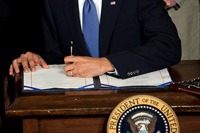Congressional Republicans are trumpeting a cache of emails they’ve obtained that give a glimpse into how the White House’s deal with the pharma industry on healthcare reform came together. It makes for great election year theater, of course – fodder for attack ads and fundraising letters blasting White House collusion with Big Bad Pharma — but beyond a glimpse into the grubby business of how the policy sausage is made, there isn’t really any ‘there’ there.
The memos reveal: that top administration officials were at the bargaining table; that PhRMA agreed to take an $80 billion hit to avoid Medicare Part D price controls on dual eligibles, reimportation of drugs into the US from other countries and other measures; and that Pfizer and its then-CEO Jeff Kindler served as the whip hand marshalling industry support for the deal. No surprises there.
Perhaps the ugliest of the previously-reported revelations that House Energy and Commerce Committee Republicans unearthed is that PhRMA agreed to fund advertising supporting the legislation, on its own behalf and through third parties, as part of the deal. This sort of quid pro quo, shading as it might into partisan political advocacy, is unseemly, and the incentives dangled by the White House – help us out or we’ll let Henry Waxman’s pro-importation and price controls faction drive the legislative steamroller – smacks of a protection racket. But that’s politics, and politics, as they say, ain’t beanbag.
In short, the documents show Administration officials working to muscle through a legacy-shaping piece of legislation and PhRMA advocating for the interests of the drug industry. That’s not to say, of course, that there aren’t a few titillating gems in there – such as the references to the “Gang of Five” CEOs in charge on the PhRMA side of the table (presumably Pfizer’s Kindler, Merck’s Dick Clark, AstraZeneca’s David Brennan, Abbott’s Miles White and Amgen’s Kevin Sharer) behind the deal, or PhRMA communications chief Ken Johnson panicking when the White House leaked word of a deal with the group to the Washington Post as it sought to turn the tide of an ugly press week.
“Maybe that buys us some love from them,” said Johnson in the June 18, 2009 email, but “Once we go to this event, there is no turning back on the commitment even if health care reform tanks.”
Regarding the presser announcing the deal, PhRMA federal affairs chief Bryant Hall writes: “They are having ‘problems’ putting the event together. I told them that at this late hour would be very difficult to get a CEO. Also told them that any event should link donut hole to health reform and be only positive msgs…nothing about what seniors have NOT been getting.”
There’s an email exchange between Pfizer execs detailing the give-and-take over that $80 billion figure and what the industry might expect in return from the legislation. Pfizer economist Kirsten Axelsen reports on a meeting with White House officials, saying there’s been “little movement or agreement.”
“They heard the 6% number from the Goldman analyst and believe that they are making coverage better for enough people that we will experience a significant increase in volume that will offset rebates.
Some of the arguments that Medicare part D wasn’t a big revenue increase did seem to resonate as did the 70% share of generics and the billions going off patent and flat growth in the next five years. However. I don’t gel the sense that they are sold on the 6% number because of great analytics – it just provides a justification to extract significant pay-fors from the industry.”
Axelsen adds: “They are looking for over $100B from the pharma industry …. They think that Pharma is in a relatively similar position to gain compared to hospitals from health reform.”
And then there’s PhRMA’s Hall telling a colleague: “But the WH is fucking this up. These guys deal w the numbers like they’re real. It isn’t smart.”
In an October 12, 2009 email to Hall and Pfizer’s Sally Susman, Kindler says White House healthcare reform office head Nancy-Ann DeParle told him that Karen Ignagni, head of insurance industry trade group AHIP, complaining of Administration favoritism toward the drug industry, “basically saying that because WH and [the Senate Finance Committee] took it too easy on us, had to hit insurers hard. And if WH and Finance hit us harder, inference is they would let up on their attacks on bill.”
An Energy and Commerce spokesperson allowed that there wasn’t too much previously unreported information in the memos, but said “many of the stories offered conflicting information and the administration actually denied some of the specifics or shifted the focus on to the Senate Finance Committee,” and that “the reason we had to conduct this investigation in the first place is because the Administration failed to conduct these negotiations in front of CSPAN cameras as it repeatedly promised it would do.”
Coalition for Healthcare Communication head John Kamp said the investigation is more bark than bite.
“The Commerce Committee Republican members want to take PhRMA to the woodshed for supporting Obama and the Affordable Care Act,” said Kamp. “It’s more political theatre than substance. PhRMA has new board and staff leadership, and PhRMA and its members are some of the strongest supporters of Republicans. I suspect this will all blow over soon.”








